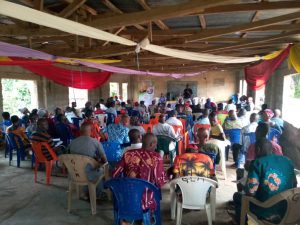SPACES FOR CHANGE | S4C’s benefit-sharing campaign ship berthed at Ilile and Obitti Ukwu communities in Ohaji /Egbema local government area on November 28, bringing together 301 attendees comprising traditional rulers and their cabinets, traditional prime ministers, the town union President Generals, women and youth leaders, and hundreds of natives from the two communities. Both Ilile and Obitti Ukwu are oil and gas producing communities hosting a number of indigenous and multinational oil corporations such as Sterling Global Company, SEPLAT, Shell Petroleum Development Company (SPDC), operators of the Assa North Ohaji (ANOH) gas project.
Through the series of presentations and vibrant interactive sessions at the townhalls, S4C learned more about extractive industry practices in areas of new oil finds, the nature of the operators’ engagement with their host communities from the standpoint of poverty and gender equity issues, and also gauge local stakeholders’ perceptions about the benefits and impacts of the macro-development projects going on in their locale. The information exchange will not only inform the agenda for local action, but also enable communities fashion out a homegrown, multifaceted engagement approach tailored to their own local situation and stakeholder needs.
Community exclusion topped the list of local concerns about extractive industry practices. In Ilile community, natives merely observe the influx of foreigners and the constant movement of heavy equipment into the community, but remain largely unaware of the specific corporations operating there. The corporations also prefer to interact directly with a few landowners that own the fields where the oil discoveries were made. Speculations are rife that an oil company is planning to execute a global memorandum of understanding (GMOU) with the community, but locals fear their evident capacity deficit to negotiate better benefits and demand stronger legal protection against environmental harms, might pose serious challenges. Seeking S4C’s technical assistance in this direction, Ilile community is determined to resist the divisive tactics companies employed in neigbouring villages, which is currenting fueling youth restiveness and inter-community rivalries.
In Obitti Ukwu, the community is anticipating a GMoU with Sterling Global company, but locals aren’t sure whether it is oil or gas that is being extracted from their community. The anticipated GMOU will add to the list of two previous GMOUs the community signed with SEPLAT and SPDC in respect of the ANOH project. Obitti representatives signed the GMOU without seeking independent legal advice and capacity-building. The signing of GMOUs with the multinationals, coupled with the litany of verbal promises of development progress made to the natives, have yet to translate to any marked improvement in local living conditions.
Decades of governmental neglect and poor infrastructure place Ilile and Obiti Ukwu communities at the bottom of human development index in the state. Ilile has been experiencing a total blackout of electricity for several years following a mass disconnection since 2015 till date. Most of the local youth are unemployed and lack basic skills needed to gain access to social and economic opportunities. Likewise, Obitti community comprised of 19 villages has no town hall, no secondary school, one dilapidated health centre and also experiences total blackout due to non-availability of electricity. Youth restiveness is also on the rise there.
A presentation by S4C’s Extractives Officer, Mr. Osahon Nosayame, addressed some of these concerns. First off, communities need to understand the type of licenses held by oil companies operating in their locality. This is because disparate responsibilities and benefits are attached to different kinds of licenses and leases. So, in order to understand the full range of benefits, entitlements and participative opportunities accruing to them, the first step is to ascertain whether the companies hold Oil Exploration Licenses (OEL), Oil Prospecting Licenses (OPL), Oil Mining Leases (OML) or Marginal Field Licenses (MFL). Secondly, some of these benefits are backed by law. Section 3(2) of the Nigerian Oil & Gas Industry Content Development Act, 2010 (Local Content Act) mandates oil and gas companies to give exclusive consideration to Nigerian indigenous service companies which demonstrate ownership of equipment and to Nigerian personnel who have the capacity to execute such work. By section 28(2) of the Local Content Act, the operator or project promoter of oil and gas facility is required to recruit a reasonable number of personnel from areas it has significant operation.
The communities also learned how to effectively engage the oil companies and extract favorable deals for their community through skillful negotiations and constructive engagement. S4C team also shared detailed strategies for negotiating GMOUs and transforming the power dynamics between corporations and communities. Other information shared delved into the rights of host communities and the existing recourse mechanisms for seeking legal redress for exclusion and environmental damage. Moving from information sharing to knowledge-driven actions, workplans were developed on how to take the next steps towards securing greater community participation, justice and accountability.
S4C’s benefit-sharing campaign is committed to providing oil and gas host communities with transparent information that could also help them understand and exercise their rights, roles and responsibilities within the broader context of the energy sector and how they can hold local government and companies accountable for the consequences of extractive activities. The townhalls in Obitti and Ilile represent an important first step in building mutual trust to facilitate a common understanding of local stakeholder priorities and establish collaborative partnerships that enable the collective voice of local actors to be heard in the extractive sector.






















